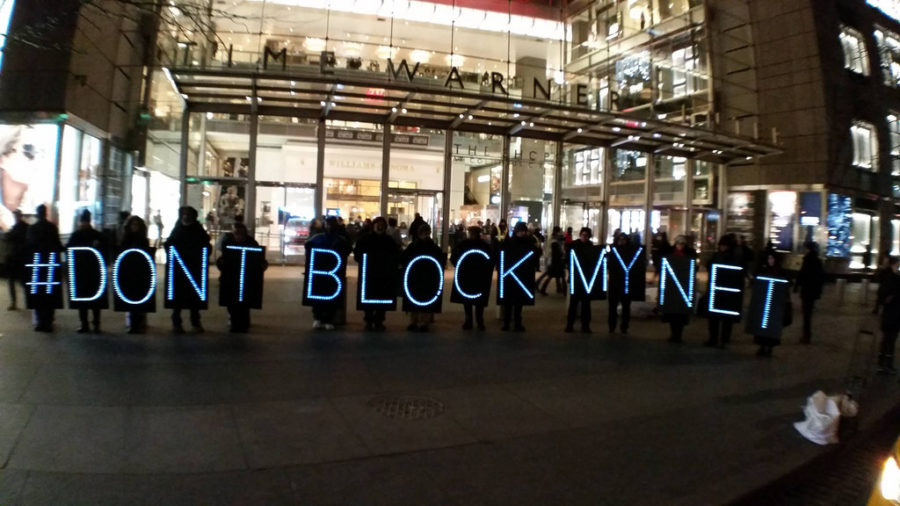Net neutrality: What’s really at stake?
Reporters of the FCC’s repeal gathered outside the Time Warner Center in NYC. Source: https://www.flickr.com/photos/backbone_campaign/16534114150
February 1, 2018
On Thursday, December 14th, the Federal Communications Commission successfully voted to repeal the Obama-era net neutrality rules.
Many had taken to social media to sound the alarm, urging people to connect their congressman and members of the FCC.
With such an avid reaction, many can’t help but feel distressed. But what exactly is net neutrality?
Net neutrality was enacted in order to enforce indiscriminate internet access. Under net neutrality, internet service providers are prohibited from favoring certain sites or services; your provider can’t, for instance, slow down your connection on the sites of businesses it competes against.
iSchool sophomore Hayden Mosher Smith explains: “Net neutrality is the official legalization of the idea that you can’t speed up or slow down access to certain sites. It laws for internet providers stating that they can’t block or slow down access to legal sites.”
Net neutrality was designed to make it so that the Internet remains an unbiased source of information. People began to worry, however, when president Donald Trump appointed Ajit Paji, who had previously voted against net neutrality regulations, to chairman of the FCC.
Paji once described net neutrality as “a solution that won’t work for a problem that didn’t exist,” according to reason.com.
The motivation for the repeal? In a word, money.
“Congress is trying to give more money to these big monopolies and huge companies,” says Zoe Sheehan, iSchool junior. “It’s just so the rich can get richer.”
The repeal also raises concerns about free speech and press, with what we see online potentially being controlled.
“People are going to be charged for certain services,” Gabriela Lebron, iSchool freshman, reasons. “It’s the government’s way of censoring certain material.”
In December, 30 senators introduced a resolution of disapproval, which could successfully overturn the FCC’s decision.
While this resolution brings some hope, it must successfully go through both Congress and the president. What individuals can do now is contact their congressman and make sure that they’re aware of people’s stance on the repeal.
Sheehan explains why she feels that unbiased internet access is important: “It’s a way to express ourselves. It’s a way for us to connect with people we wouldn’t get to in real life, and to connect with people from real life that we wouldn’t be able to otherwise.”
Smith emphasizes the significance of the information the internet holds: “The Internet is literally an infinite data base of all information humankind has ever known. If we don’t have access to that database it will be hard to make advancements in any field.”
“If we’re a free country, things like the internet shouldn’t be taken away from us,” says Lebron. “We should have sources that have credible information rather than what companies want us to know or see.”


